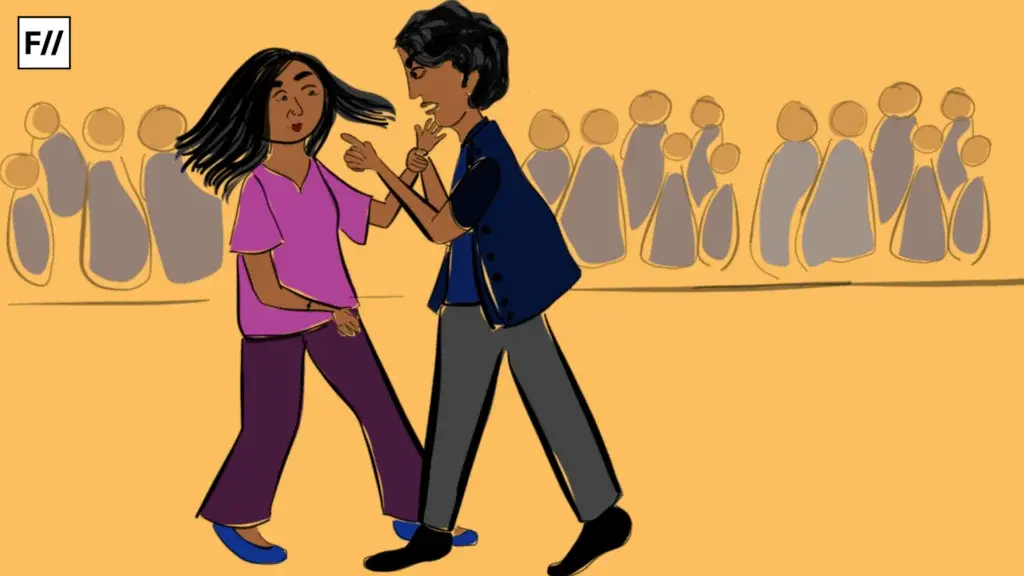This article is part of the #GBVInMedia campaign for the 16 Days Of Activism global campaign to end gender-based violence. #GBVInMedia campaign analysis how different kind of mainstream media (mis)represents/reports gender-based violence and broadens the conversation from violence against women to violence against people from the queer community, caste-based violence and violence against people with disabilities. Join the campaign here.
India has over 2.19 crore disabled people, amongst which more than 90 lakh are women. Research suggests that women with disabilities are more likely to suffer domestic violence and four times more likely than any other to suffer sexual violence. Also, 80% of women with disabilities are victims of violence.
Yet, when BBC published a long research-based feature on India’s domestic violence problem in 2014, it did not mention the disabled victims even once in passing.
This neglect of the disabled part of the victims personality is not only a problem with the media, even the Government does not hold any records specific to violence against disabled people, especially women.
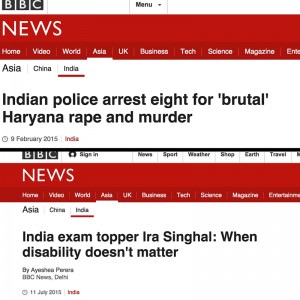
BBC News – A comparison of headlines
The brutal Rohtak rape case in February of this year, when a mentally-challenged woman from Nepal was gang raped and then murdered, got much media-attention, but one which focussed only on the brutality of rape, and not the disability of the victim. Though most news reports in mainstream print publications mentioned in their lead paragraph that the victim was a mentally-challenged 28 year old woman, few found the information important enough to make it into headline. Hindu, Times of India, Indian Express and the leading news agency Press Trust of India fall into this category.
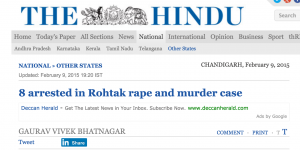
When news about Ira Singhal, the IAS topper for 2015, made it into media, surprisingly, BBC and India Today included that the topper is a disabled woman, right into their headlines.
It is worth noting that though it was the first time than a differently-abled woman topped an IAS examination, the physical disability is not a crucial part in determining a person’s intellectual ability to write the exam. Yet, the mentally challenged part of the rape victim’s personality in the Rohtak case is important enough to be highlighted, because it would have been harder for her than a mentally fit person to report the rape later has she not been murdered after that.
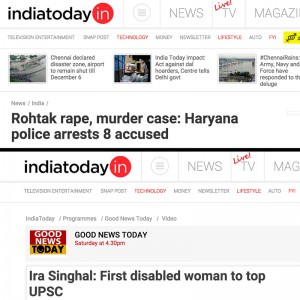 When it comes to disabled people, the society treats them as asexual beings, with sex education programmes for them being only few and far between. Hence, the impact of sexual assault against a disabled woman who has been taught to suppress her sexuality and has a lack of general understanding of the issue is very heavy.
When it comes to disabled people, the society treats them as asexual beings, with sex education programmes for them being only few and far between. Hence, the impact of sexual assault against a disabled woman who has been taught to suppress her sexuality and has a lack of general understanding of the issue is very heavy.
A headline is an important part of a copy; and one which is often changed by senior editors after a reporter files a story. When reporting on cases of sexual assault against disabled woman, the reportage in media should be reflective of the heinousness of the crime.
Crime reporters and editors in the media should be aware that a crime against a disabled woman is of the highest order and falls under two separate subsets of the victim’s personality – that of gender, and disability.
However, major mainstream online publications which have more space for a headline than the conventional media, and where each headline is looked at as a click-bait, did a better job at reporting the Rohtak case.
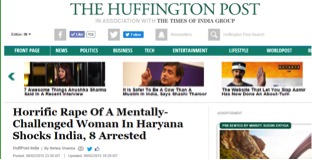
 In a nutshell
In a nutshell
Along the similar vein that feminist academics have been pushed to see that not all women are white, straight and cis, media professionals working on crime stories need to be vigilant of the many facets of violence that disabled women encounter, not just because of their gender but physical or mental conditions as well.
Till the mainstream news media is ignorant of highlighting the disability aspect of victims of violence, and keep lumping all women together, the needs and the special laws for disabled women would not gain the urgency required to move the government and legal professionals.
Featured Image Credit: Hesperian
About the author(s)
Shaifali is a New-Delhi based journalist, interested in art, culture, and gender issues.

 In a nutshell
In a nutshell

